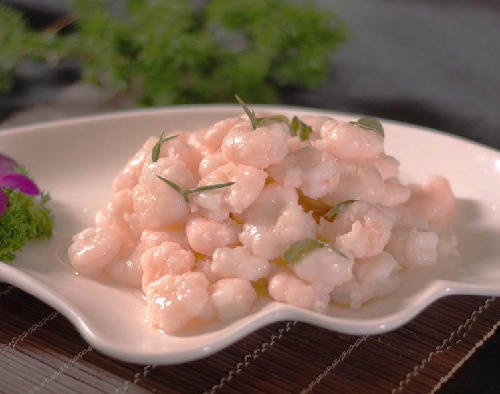

Longjing tea originates in the picturesque West Lake in Hangzhou and is famous for its jade-green color, aromatic fragrance, tasty flavor, and delicate shape. It is said that the tea gained its reputation during the Tang and Song dynasties, and its production techniques were enhanced over the generations to afford it a place in the imperial court during the Qing Dynasty. River shrimp was also a typical delicacy of the time, lauded for its freshness, rich nutrition and detoxifying properties.
Longjing Shrimp, like many other classic dishes, is closely connected to Qing Emperor Qianlong (1711-1799). On his excursion to the south, he dressed as a civilian and traveled around the West Lake. Stopping at a Longjing Village farmhouse, he was offered a cup of tea made from freshly-picked tea leaves. The brew was so tasty that he grabbed a handful of tea leaves as he left and hid them in his imperial gown. Later, while eating at a restaurant, he asked the waiter to make the tea. Catching a glimpse of the disguised Emperor’s imperial gown, the waiter rushed to tell the owner, who was cooking shrimps. Reeling from the shock, the owner mistook the tea leaves for shredded green onion and scattered them into the pan. The pink shrimps dotted with green tea leaves emanated an alluring fragrance that immediately captured the Emperor’s heart. Soon, chefs at the renowned restaurant in Hangzhou were making bold steps, innovating cooking techniques to make the dish a specialty.
Ingredients:
1,000 g fresh shrimps, 1.5 g Longjing tea leaves, one egg white, 1.5 g Chinese cooking wine, 3 g fine salt, 40 g starch, 75 g lard.
Method:
1. Peel and thoroughly wash the shrimps. Pat dry with kitchen paper.
2. Put the shrimps in a bowl, and add a pinch of salt and the egg white. Stir to make a sticky mixture. Add the starch, and mix until the shrimps are evenly coated.
3. Brew the tea (1.5 g tea leaves in a cup of 50 g boiling water) and set aside, uncovered, for one minute. Filter 4/5 liquid tea and keep the tea leaves.
4. Melt the lard in a hot wok and add the shrimps. Using chopsticks, quickly stir fry the shrimps so that they cook evenly. After approximately 15 seconds, fish the shrimps out of the oil with a strainer, leaving some oil in the wok.
5. Add the brewed tea and residual liquid tea, Chinese cooking wine, and the remaining salt to the pan, and return the shrimps to the wok. Stir quickly and serve.